2022 World Fantasy Convention Report

The 48th World Fantasy Convention was held as a hybrid event November 3-6, 2022, with the Hyatt Regency hosting the in-person portion in New Orleans, that destination Louisiana city so renowned for its cuisine, music, and atmosphere. Guests of honor were Ginjer Buchanan, Victor LaValle, and Jo Walton, with Iris Compiet as artist guest of honor, Andrei Codrescu and Brandon O’Brien as special guests, Nisi Shawl as featured guest, plus toastmaster Ursula Vernon. Caitlín R. Kiernan had been announced as a special guest but was unable to attend. Life Achievement Awards winners were Samuel R. Delany and Terri Windling.
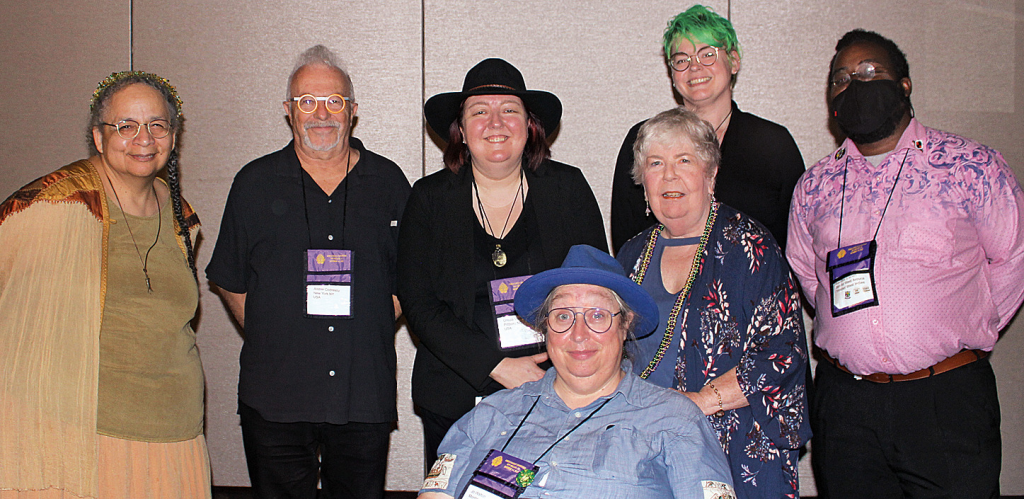
Brandon O’Brien
There were 652 total memberships registered for the convention, representing 15 countries and 46 US states, with 490 warm bodies at the con proper and 71 virtual ‘‘warm bodies,’’ plus 14 supporting members and 77 no-shows. In 2021 the hybrid World Fantasy saw 470 total memberships: 334 attending with 207 warm bodies, 40 virtual memberships, 14 supporting, and 260 no-shows, including virtual members. The 2020 online World Fantasy saw 547 registered members plus 11 supporting members. Both conventions were down compared to 2019, which saw 660 warm bodies out of 762 memberships purchased.

Con-goers received the customary book bag as well as a digital ‘‘book bag’’ with additional downloadable titles. They also received the full-sized, perfect-bound souvenir book featuring cover art by GoH Iris Compiet, with more Compiet art inside, plus the committee list, the World Fantasy Award nominations and honorees, appreciations and bibliographies for the toastmaster, GoHs, special guests, featured guest, and Life Achievement Awards winners, an in memoriam, plus short stories, poetry, art, and book excerpts by the guests.
CONVENTION NOTES
Virtual and recorded items were broadcast via Zoom, and some in-person panels included both physically attending and livestreamed participants. Programming director Pamela Oberg said, ‘‘In the past the WFC Board has not permitted business-type sessions, but we were able to test them this year. They were overwhelmingly well attended.’’ Oberg named several, such as ‘‘Managing A Multi-Book Series.’’ Vice-chair Ginny Smith said, ‘‘One of the things members were enthusiastic about is the fact that they can view the recordings of a majority of the sessions online for three months following the convention.’’
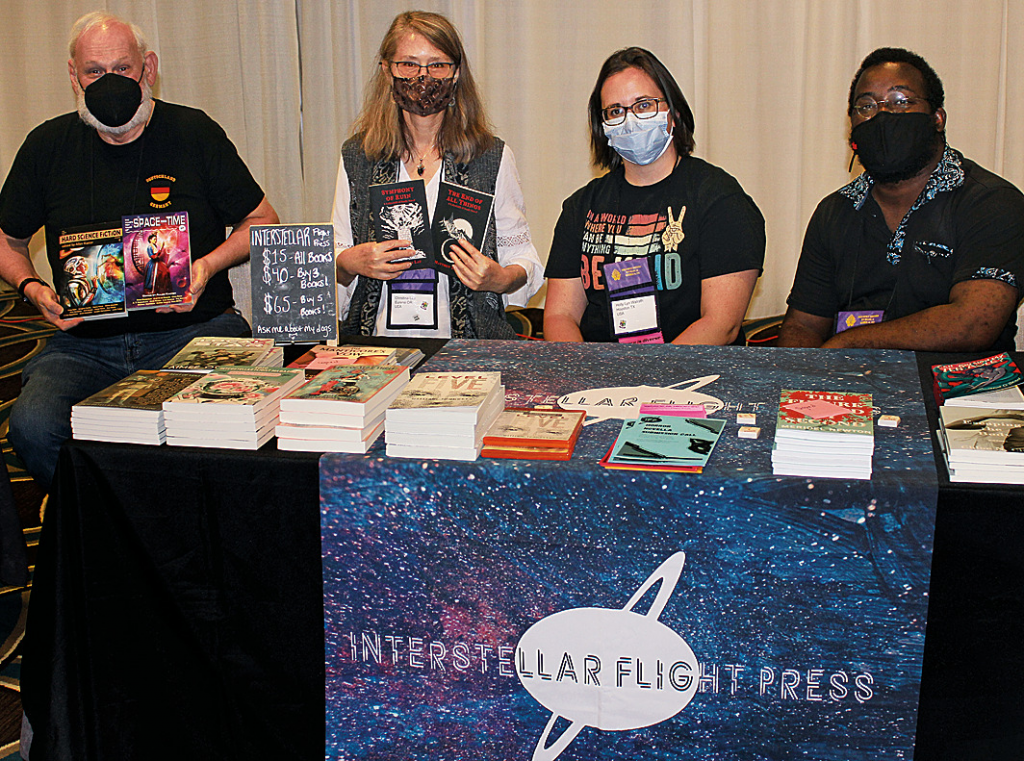
Programming started Wednesday and Thursday with ‘‘pre-con workshops’’ covering a range of topics. A few panelists and presenters cancelled at the last minute, leaving some panels a person short or with a substitute speaker. Our listings here follow what was scheduled. Panels and readings began Thursday after noon with ‘‘Queer in the Market: The State Of LGBTQ+ Representation in Fantasy and Horror Publishing’’ featuring Cheryl Morgan, Heather Osborne, Izzy Wasserstein, Vanessa Rose Phin, Talulah J. Sullivan, and ‘‘Integrating Music into Fiction’’ with Sheree Renée Thomas, Sephera Giron, Sarah Pinsker, Scott Andrews, J.H. Fleming. Opening Ceremonies were held at 8:00 p.m. that evening.
Programming reported 58 panel discussions, with 183 in-person participants and 26 virtual. Highlights included topics such as ‘‘Fantasy International’’ with Ahmad Siddiqi, Usman T. Malik, Gautam Bhatia, Ed McDonald, and Oghenechovwe Donald Ekpeki; ‘‘Creating the Monsters of the Human Soul’’ with Victor LaValle, Kelly Robson, Matt Cardin, Nathan Ballingrud, Catriona Ward; and ‘‘Brandon O’Brien’s Fantastical Speculative Open Mic Night’’ where anyone could read their work.

There were 88 readings, compared to 2021’s 82 slots and 47 in 2019, but not quite matching 2018’s 100+ readings. This year’s set included Eugen Bacon, Gerald Brandt, Julie C. Day, Randee Dawn, Stephanie Feldman, Eileen Gunn, Rhiannon Held, Alyc Helms, Karen Heuler, Alex Irvine, Alex Jennings, Kathleen Jennings, Derek Künsken, A.C. Wise, and many more, some of which were virtual.
Smith commented that ‘‘One of our recommendations for next year’s World Fantasy Convention in Kansas City is to investigate closed captioning. We attempted to do so, but the online convention platform we were using did not offer that capability.’’

Nightly parties ran in the party suite: a fairly standard, quickly sweltering room, where attendees could compare notes on their days at the con. The gatherings were well attended and hosts included SFWA and World Fantasy Kansas City (2023).
The dealer’s room saw slow but steady traffic. Eighteen dealers were present, including Larry Smith Books who also handled consignments, and a number of book publishers, such as Fairwood, Tachyon, GuardBridge, and more.
The WFC art show was small but well organized, featuring 19 artists, including GoH Iris Compiet, Peri Charlifu, Sara Felix, Kathleen Jennings, Elizabeth Leggett, Vincent Villafranca, Hershel Brewer, and more. Total sales hit an estimated $19,000. A lively art reception was held Saturday evening, with treats and a cash bar. Best in Show went to ‘‘Readers’’ by Lisa Snellings; Body of Work to Villafranca; and Director’s Choice to ‘‘Hope’’ by Iris Compiet.
The mass autograph session was Friday night. A large hall hosted roughly 40 individuals, some without their books on hand to sign. The atmosphere was friendly and authors were in high spirits. Signers included E.C. Ambrose, Holly Black, Gwenda Bond, Ellen Datlow, Susan Forest, Jeffrey Ford, Laura Anne Gilman, Eden Robins, Christopher Rowe, Delia Sherman, Fran Wilde, Walter Jon Williams, and more.
AWARDS BANQUET
The World Fantasy Awards were held Sunday at 2:30 p.m. Approximately 75 people attended, up from the prior year’s even more modest 50. As with the prior year, the overall mood was jovial.
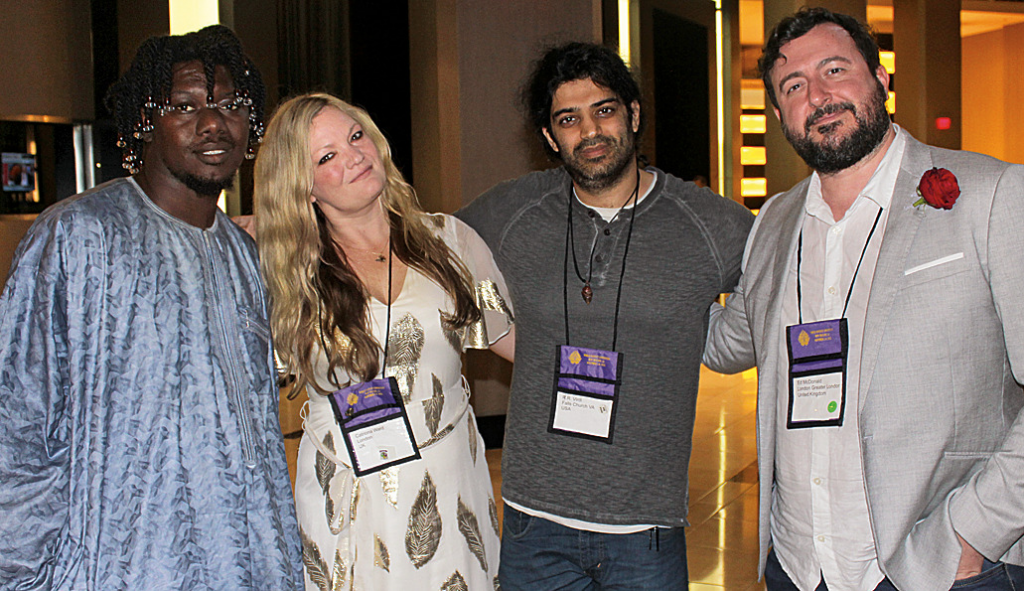
Ed McDonald
Toastmaster Ursula Vernon opened by saying that usually the toastmaster discusses something relating to the theme of the convention. ‘‘Our theme this year is ‘New Rhythms and Old Souls,’’ she said, joking that ‘‘the problem is I have no rhythm, I was born without it, and when I moved to Minnesota – Prince got all the rhythm for the state, we’ve been running on a terrible deficit ever since.’’ She instead talked about paleontology, including sturgeon otoliths, terror birds, and other creatures, which became an ongoing theme throughout the awards. The guests of honor were invited to take the stage to say a few words. Ginjer Buchanan exhorted the audience to support Charles de Lint and MaryAnn Harris – who was hospitalized due to Powassan virus – via their GoFundMe page <https://www.gofundme.com/f/harris-de-lint-recovery-fund>; Victor LaValle discussed how welcoming genre communities had been towards him, and ‘‘as much as is possible, I hope the community of the fantastic will continue to open those doors to more and more new kinds of writers, writing about new experiences, different parts of the world, different ways of living, different faces and places….’’; Jo Walton talked about accessibility, saying, ‘‘I want to say ‘thank you’ for how mobility accessible this convention is,’’ and commented that the convention was not accessible to individuals with other kinds of disabilities, but that we ‘‘save the world a little bit every time with our partial victories… take the small steps; take the partial victories.’’ Iris Compiet thanked the convention organizers and attendees; Nisi Shawl discussed the term ‘‘fantasy’’ and ‘‘how it defies definition, or how it ignores definition,’’ ascribing the growth of what fantasy encompasses, in part, to increased ‘‘global and racial inclusivity… the field is stranger and richer than ever before, and I thank you for helping it to grow that way.’’ Brandon O’Brien expressed gratitude for community, and talked about the difficulties of being in that community for some in various geographic locations or financial situations, saying, ‘‘Making room for people to tell their stories is also part of the storytelling work; and it takes a lot of effort, and can sometimes be very tiring and thankless. And I thank you for doing the work anyway, even when there is more work to be done.’’ Andrei Codrescu read some of his poetry on the nature of stories.
Gordon Van Gelder and Jo Fletcher thanked the judges; and ‘‘put in a blanket apology for every name we mess up… I cannot get every name right,’’ Van Gelder said, ‘‘but I do my best.’’
Van Gelder talked about how Life Achievement Award recipient Samuel R. ‘‘Chip’’ Delany is a ‘‘towering figure in science fiction’’ but ‘‘tends not to get as much attention for his fantasy work’’ and credited Delany as someone who ‘‘in a way no one else did, in my opinion, before him, brought political and sociological relevance to fantasy.’’ Van Gelder read Delany’s speech, in which he said, ‘‘I’ve always looked at the World Fantasy Convention, with its awards, as something to stand on the outside of, and look at rather enviously.’’ He discussed a number of bad reviews he’d received over the years, saying, ‘‘I have a suspicion that there may be some overlap between at least one or two of these ill-reviewed works, and possibly some of the works that today you are honoring me for. And again the only thing I can say is thank you.’’
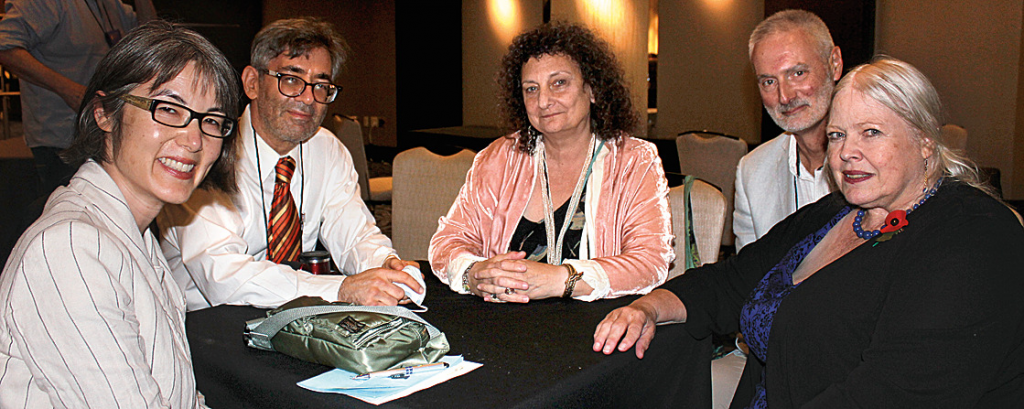
Jo Fletcher
Fletcher introduced Terri Windling, saying ‘‘she has poured magic into our world.’’ She described Windling’s history and growing influence since the days of being a book editor at ACE, saying, ‘‘All these years later, as retold fairy tales become hot again, well, you know what? That’s thanks to Terri and her hand.’’ Fletcher credited Windling as creating one of the most important shared worlds as well as ‘‘one of the places that urban fantasy started’’ with the Borderland series. Windling accepted her award via video, speaking to the history of fantasy overall, saying, ‘‘We’ve seen a lot of things change since then, but the core of fantasy –- its magic, wonder, and mystery -– remains timeless…. What makes this literature great, and timeless, is that every novel or story, painting or performance, is in conversation with those that came before it, as well as with those of the future.’’ She thanked her husband and daughter, agent Christopher Schelling, Tor and in particular Patrick Nielsen Hayden and Beth Meacham, and many others.
The first World Fantasy Award of the evening, Special Award, Non-Professional went to Tonia Ransom for Nightlight: A Horror Fiction Podcast. Ransom thanked the judges, partner and sound designer Jen Zink, her sister, son, and boyfriend, and more. ‘‘I’ve heard from people who didn’t consider themselves racists in the beginning, but realized they have a lot of bias, and after listening to the podcast, it made them confront that bias, so they thanked me for that, so I’d like to thank them for telling me that: that is one of the reasons that I started Nightlight, was to fight racism and xenophobia. I think art is a great way to do that.’’
The Special Award, Professional went to Marjorie Liu & Sana Takeda, for Monstress Volume Six: The Vow.
Tran Nguyen won the award for Best Artist. Fletcher read Nguyen’s speech, saying that being a freelance illustrator is both rewarding and ‘‘a lifelong emotional rollercoaster, filled with artistic insecurities….’’ and spoke on the need for occasional reassurances, thanking the World Fantasy Judges ‘‘for this award and their encouragement.’’
Best Collection went to Midnight Doorways: Fables from Pakistan by Usman T. Malik. Ahmad Siddiqui accepted for Malik, who delighted the audience by effectively lacing humor into the brief acceptance. Malik expressed gratitude to family, readers, judges, and more.
Best anthology went to The Year’s Best African Speculative Fiction (2021), edited by Oghenechovwe Donald Ekpeki. Emotional at first, Ekpeki was bolstered by applause from the audience, and delivered a rousing impromptu speech about the difficulties of writing, editing, and publishing from the African continent. ‘‘The first thing that came to mind when I stood here,’’ he said, ‘‘was ‘I’m not supposed to be here.’ And that’s not being pessimistic, it’s the reality when we’re talking about the journey.’’ Details included internet trolls, legal bureaucratic barriers, antagonistic publishing practices, and more. ‘‘I chose to be here. And I wasn’t the only one who chose. Everyone who contributed to my crowdfunding drive, everyone who voted for me… chose along with me for me to be here. Which means a very important thing: that when we stand together, we are stronger than institutions, than the persons that decide that we should be divided, that decide that some of us are not enough. So I would like to thank everyone who contributed to choosing with me…. I want to ask that we continue to choose, to allow everybody who deserves it to be on this stage. This moment belongs to all of us who chose.’’
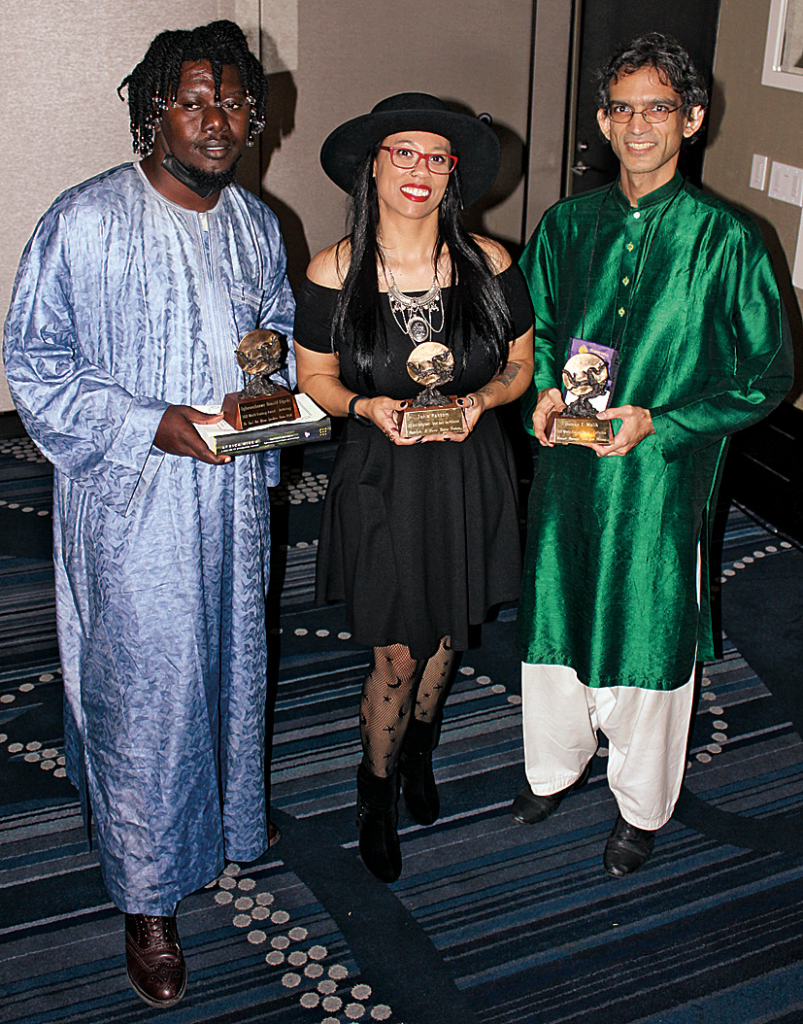
Oghenechovwe Donald Ekpeki, Special Award
– Non-Professional: Tonia Ransom, Best Collection:
Ahmad Siddiqi (for Usman T. Malik)
‘‘(emet)’’ by Lauren Ring published in the July/August 2021 issue of F&SF won the Best Short Fiction Award. Ring accepted by video, and moved the audience with a speech discussing the barriers of accessibility issues with conventions. ‘‘In discussions of accessibility, I often see statements along the lines of ‘well, we don’t have any disabled people here anyway.’ I always want to ask, ‘‘Can we be here?’’ Can I afford the hotel room? Can I get enough time off of work? If there are steps to the stage for the ceremony, can I still wear high heels? Sometimes, the choice is made for us. There are steps to the stage for the ceremony. No wheelchairs allowed.’’ Ring thanked her mother, her girlfriend Valentino, writing buddy Nicole, as well as Sheree Renée Thomas, ‘‘whose editorial hand shaped the clay of my story,’’ Nisi Shawl, and more.
The World Fantasy Award for novella went to And What Can We Offer You Tonight by Premee Mohamed. Mohamed accepted by video, thanking the judges and other finalists ‘‘who wrote incredible stories in what I think we can all admit is kind of a tricky length to write.’’ She thanked agent Michael Curry and editor dave ring, commenting that ‘‘small presses in every genre are doing great work for very little notice and reward,’’ as well cover artist Carly Allen-Fletcher.
The Best Novel Award went to The Jasmine Throne by Tasha Suri. Enthusiastic, Suri thanked her wife, Orbit and her editor Priyanka Krishnan, agent Laura Crockett, the judges and volunteers, and more. She said, ‘‘Everything that I would want to say I said in my books. I often felt like being a queer person and a brown person in the diaspora was like a silence, was something that I had no words for. But I found a way to express it in my writing. So thank you for taking the thing that was made and rewarding it which is profoundly important to me.’’
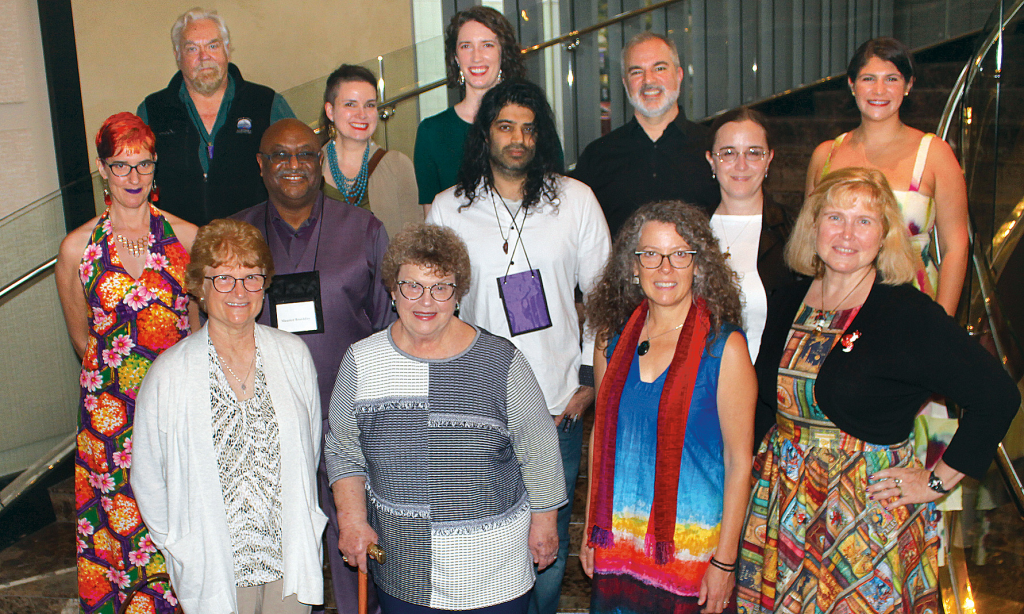
The next World Fantasy Convention is scheduled to be held at the Sheraton Kansas City Hotel at Crown Center in Kansas City MO, October 26-29, 2023 with guests of honor Kij Johnson, Elizabeth Leggett, Jonathan Strahan, Vincent Villafranca, and toastmasters Steve Barnes and Tananarive Due.
For more information, see the WFC 2023 site.
–Arley Sorg
See this listing and more like it in the December 2022 issue of Locus.
 While you are here, please take a moment to support Locus with a one-time or recurring donation. We rely on reader donations to keep the magazine and site going, and would like to keep the site paywall free, but WE NEED YOUR FINANCIAL SUPPORT to continue quality coverage of the science fiction and fantasy field.
While you are here, please take a moment to support Locus with a one-time or recurring donation. We rely on reader donations to keep the magazine and site going, and would like to keep the site paywall free, but WE NEED YOUR FINANCIAL SUPPORT to continue quality coverage of the science fiction and fantasy field.
©Locus Magazine. Copyrighted material may not be republished without permission of LSFF.







